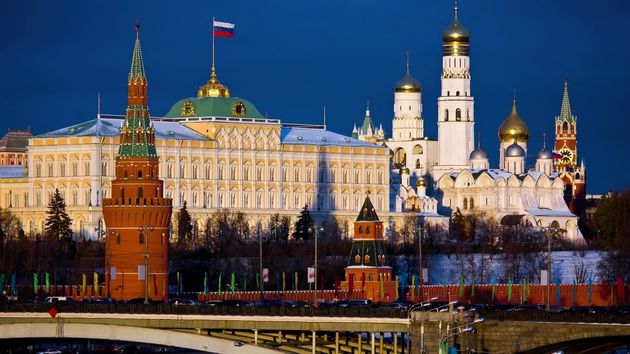Red tide rising
Gavin Matthews on Arkady Ostrovsky’s The Invention of Russia.
17 FEBRUARY 2017 · 13:40 CET

Western observers of Russia today often appear perplexed as to how a nation which emerged so optimistically from under the long shadow of Soviet totalitarianism, seems to be so readily dispensing with liberal freedoms.
Arkady Ostrovsky’s book is a superb explanation of the causes, development and consequences of that retreat, which both informs and alerts the reader to the ongoing difficulties which dealing with Vladimir Putin’s Russia will present for some time to come.The Invention of Russia has just won Ostrovsky the 2016 Orwell Prize for political writing.
“Russia is an idea-centric country, and the media play a disproportionately important role in it,” writes Ostrovsky, who is the Russia analyst for The Economist. “Ideologists, journalists, editors and TV executives” have not just been transmitters of the idea of Russia, but its creators, he claims.
In communist days, media and information were a state commodity, “the means of mass communication”, essential to the whole Soviet idea. But, he rather adroitly observes, “the Soviet Union expired, not because it ran out of money, but because it ran out of words”.
Ostrovsky’s account of the turbulent 1990s, of Boris Yeltsin and his tussles with the Russian parliament, is brilliantly told. He charts the way in which the threat of communism led Yeltsin to depend on the emerging Oligarchs, who were allowed to gain inordinate wealth and power in return for their support.
There was a short time in which the media were comparatively free, when it was “too late to rally the masses under the red flag, and too soon to rally them under nationalism”.
Once Yeltsin was gone, however, the Oligarchs “behaved like caricatures of capitalism in old Soviet journals”, helping to destroy the liberal media as they moved power towards Putin, who centralised ownership and control of the press.
It was this media who invented the Russia we have today. As such there is as much about the battles to control Moscow’s TV tower, as there is as much here about struggles to control the Kremlin.
The Russia of Putin is anti-American, patriotic, collectivist, and celebrates derzharnost (geo-political prestige) and gosudarstvennichestvo (the primacy of the state).
Central to Ostrovsky’s thesis is that the free press was able to restrict Yeltsin’s Chechen war; but the compliant press under Putin has been central into whipping the population into a paranoid frenzy to justify the annexation of Crimea. The media was responsible for stirring hatred against anyone who opposed the war, such as Boris Nemstov, who was duly murdered in 2015.
Most alarming is Ostrovsky’s assessment of contemporary Russia, where “The Kremlin is cultivating and rewarding the lowest instincts in people, provoking hatred and fighting”. His view is that Russia is more dangerous than it was during the Cold War - the USSR was victor in WWII, but emerged from the end of communism with a sense of defeat and a volatile “inferiority complex”.
Today, more than “50 per cent of Russians think that it is OK for the media to distort the truth in the interests of the State”; but perhaps more worryingly, “The vast majority of Russians now contemplate the possibility of a nuclear war with America, [which] 40 per cent of the younger ones believe that Russia can win”.
Ostrovsky’s book is a challenge to the increasingly inward-looking West, which is consumed with its own economic and constitutional affairs; as was exposed in the woefully deficient debate on the renewal of Britain’s Trident nuclear weapons system.
Both those arguing for renewal, and those for scrapping Trident argued from within a vacuum, with barely a whimper of cogent assessment of the resurgent Russian threat. Both arguments were essentially unilateralist, while the absence of any multilateralist voice arguing for scrapping Trident, in tandem with a wider denuclearisation of Europe, was telling.
The need to understand Putin’s Russia is a matter of growing urgency. Ostrovsky’s The Invention of Russia informs, educates and counsels Europe not to avert its eyes from developments to the East.
Gavin Matthews is a writter, blogger and Bible-teacher.
This article was published with permission of Solas magazine. Solas is published quarterly in the U.K. Click here to learn more or subscribe.
Published in: Evangelical Focus - Solas - Red tide rising
